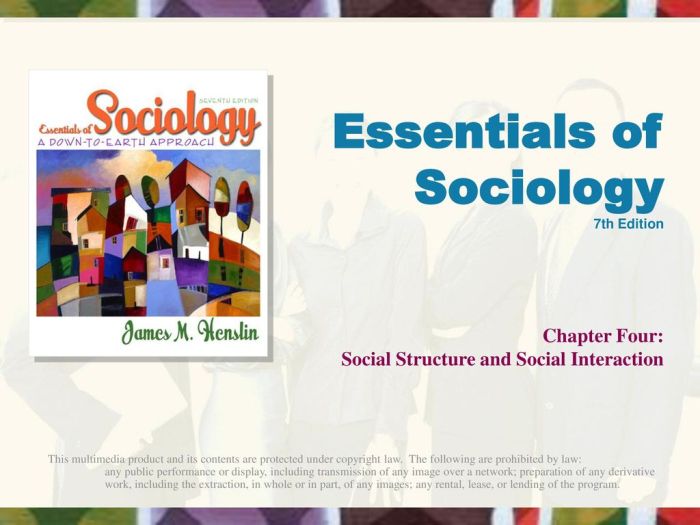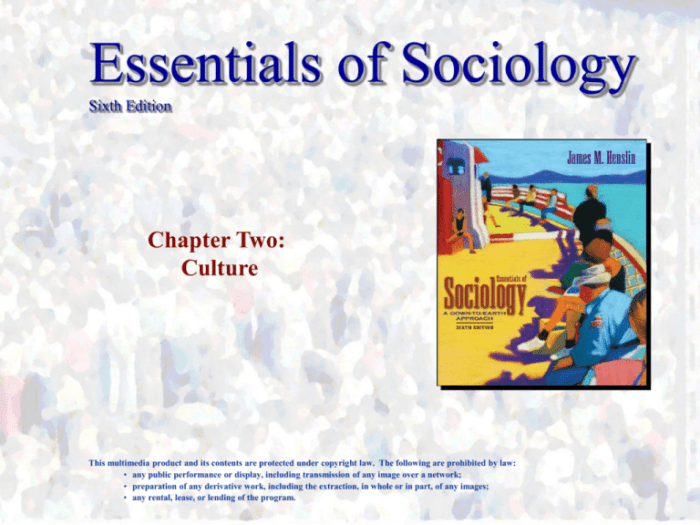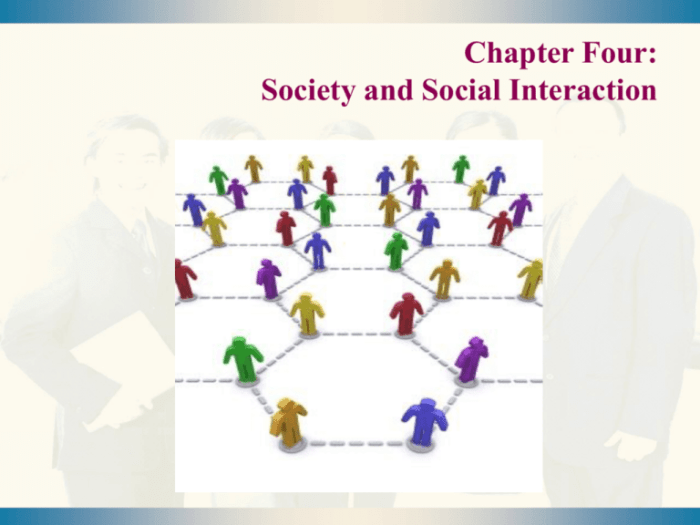Essentials of sociology 7th edition – Essentials of Sociology, 7th Edition, unveils a captivating journey into the foundations of human society. This comprehensive guide delves into the origins, theories, and methodologies that shape our understanding of social phenomena, equipping readers with a profound grasp of the complexities that govern our world.
Through its engaging narrative, this text illuminates the major theoretical perspectives in sociology, including functionalism, conflict theory, and symbolic interactionism, demonstrating their application in comprehending social dynamics. It further explores the diverse research methods employed in sociological inquiry, highlighting their strengths and limitations.
Theoretical Foundations of Sociology: Essentials Of Sociology 7th Edition

Sociology emerged in the 19th century as a response to the rapid social and economic changes brought about by industrialization. It sought to understand the underlying patterns and dynamics of human societies.
Origins and Development
The origins of sociology can be traced to the works of philosophers and social thinkers such as Auguste Comte, Karl Marx, and Max Weber. Comte coined the term “sociology” and argued that society should be studied scientifically, while Marx focused on the role of economic forces in shaping social structures.
Weber emphasized the importance of culture and subjective meaning in understanding human behavior.
Major Theoretical Perspectives
Three major theoretical perspectives dominate sociology: functionalism, conflict theory, and symbolic interactionism.
Functionalism
Functionalism views society as a complex system of interconnected parts, each of which serves a specific function. It emphasizes the importance of social order and stability, arguing that institutions and social structures exist to meet the needs of society as a whole.
Conflict Theory
Conflict theory, in contrast, emphasizes the role of conflict and inequality in shaping social structures. It argues that society is divided into groups with competing interests, and that social change occurs through conflict and struggle.
Symbolic Interactionism
Symbolic interactionism focuses on the role of symbols and communication in shaping human behavior. It argues that people interact with each other through shared meanings and symbols, and that these interactions create social reality.
Examples of Application
These theoretical perspectives have been used to understand a wide range of social phenomena, including:
- Functionalism:The role of education in socializing individuals and maintaining social order.
- Conflict Theory:The impact of economic inequality on social stratification and social unrest.
- Symbolic Interactionism:The development of language and its role in shaping human thought and communication.
Research Methods in Sociology

Research methods in sociology are systematic procedures used to collect and analyze data to gain knowledge about social phenomena. Sociologists employ various methods to investigate social behavior, structures, and processes, each with its own strengths and weaknesses.
Surveys, Essentials of sociology 7th edition
Surveys involve collecting data from a sample of individuals through questionnaires or interviews. They are widely used due to their ability to gather large amounts of data from a diverse population. Surveys are cost-effective and provide quantitative data that can be statistically analyzed.
However, surveys have limitations. They rely on self-reporting, which can lead to biases and inaccuracies. Additionally, surveys may not be suitable for exploring complex social phenomena or capturing in-depth insights.
Experiments
Experiments involve manipulating variables in a controlled setting to observe their effects. They are considered the gold standard of research methods due to their ability to establish causal relationships. Experiments allow researchers to isolate and test specific factors, ensuring internal validity.
However, experiments can be time-consuming and expensive to conduct. They may also be difficult to generalize to real-world settings, as the controlled environment may not accurately reflect social complexities.
Qualitative Research
Qualitative research involves collecting and analyzing non-numerical data to gain an in-depth understanding of social phenomena. Methods include participant observation, interviews, and document analysis. Qualitative research provides rich and detailed insights, allowing researchers to explore social contexts and experiences.
However, qualitative research is often time-consuming and may be difficult to generalize to a larger population. The researcher’s subjectivity can also influence the data collection and interpretation.
Social Structure and Inequality

Social structure refers to the organized pattern of social arrangements and institutions that shape individual behavior and societal interactions. It encompasses the norms, values, roles, and relationships that govern how individuals interact within a society. Social structure influences individuals’ beliefs, attitudes, and behaviors, shaping their experiences and life outcomes.
Forms of Social Inequality
Social inequality refers to the unequal distribution of resources, opportunities, and power within a society. It manifests in various forms, including class, race, and gender inequality.
Class Inequality
- Class inequality refers to the hierarchical division of society based on economic status, wealth, and access to resources. It creates distinct social classes, such as the upper class, middle class, and lower class, with varying degrees of power, privilege, and life chances.
Race Inequality
- Race inequality refers to the unequal treatment and discrimination based on perceived racial or ethnic differences. It can manifest in various forms, including racial profiling, housing discrimination, and disparities in education and healthcare.
Gender Inequality
- Gender inequality refers to the unequal treatment and discrimination based on gender. It can manifest in various forms, including wage gaps, unequal access to education and employment, and domestic violence.
Impact of Social Inequality
Social inequality has profound effects on individuals’ lives. It can limit access to resources, opportunities, and social mobility. For example, individuals from lower socioeconomic backgrounds may face barriers to education, healthcare, and employment, perpetuating cycles of poverty and disadvantage.
Social inequality also affects health outcomes. Studies have shown that individuals from marginalized groups experience higher rates of chronic diseases, mental health issues, and premature mortality due to limited access to healthcare, healthy food, and safe housing.
Moreover, social inequality can undermine social cohesion and create divisions within society. It can lead to feelings of resentment, mistrust, and conflict, hindering collective efforts to address social problems and promote social justice.
Social Institutions

Social institutions are organized systems of social roles and statuses that govern how people behave in society. They provide a framework for social interaction and help to maintain social order. Social institutions are essential for the functioning of any society, as they provide the means for people to meet their basic needs, such as food, shelter, and security.
There are many different types of social institutions, including the family, education, religion, and the economy. Each institution has its own unique set of roles and statuses, and each plays a vital role in society. For example, the family provides a place for people to raise children and learn how to interact with others.
Education provides people with the knowledge and skills they need to succeed in life. Religion provides people with a sense of meaning and purpose. And the economy provides people with the goods and services they need to survive.
Social institutions shape people’s lives in many ways. They determine how people are socialized, how they interact with others, and how they view the world. For example, the family teaches children how to behave and how to interact with others.
Education provides people with the knowledge and skills they need to get a job and support themselves. Religion provides people with a sense of meaning and purpose. And the economy determines how people access goods and services.
The Family
The family is the most basic social institution. It is a group of people who are related by blood, marriage, or adoption. The family provides a place for people to raise children and learn how to interact with others. It also provides a sense of belonging and support.
Education
Education is the process of acquiring knowledge, skills, values, beliefs, and habits. It can take place in formal settings, such as schools and universities, or in informal settings, such as the home and the workplace. Education is essential for personal development and for success in life.
Religion
Religion is a system of beliefs and practices that relate to the sacred or supernatural. It provides people with a sense of meaning and purpose. Religion can also provide a sense of community and support.
The Economy
The economy is the system of production, distribution, and consumption of goods and services. It determines how people access goods and services. The economy also affects people’s standard of living.
Social Change

Social change refers to the transformation of societal structures, institutions, and practices over time. It encompasses changes in social norms, values, beliefs, and behaviors, and can manifest in various forms, including technological advancements, economic shifts, and political revolutions.
Social change occurs through a complex interplay of factors, including:
Technological Innovation
- Technological breakthroughs drive social change by introducing new products, processes, and communication methods.
- For example, the invention of the internet has revolutionized communication, commerce, and information dissemination.
Economic Development
- Economic growth and industrialization lead to shifts in social structures, job markets, and consumption patterns.
- For instance, the rise of the global economy has created interconnectedness and interdependence among nations.
Political Movements
- Political movements, such as revolutions and social justice campaigns, can bring about fundamental changes in power dynamics, governance, and social policies.
- The civil rights movement in the United States is an example of a social change movement that fought for equality and desegregation.
Social change can have profound effects on society, including:
- Social mobility:Changes in social structures can create opportunities for upward or downward mobility.
- Economic inequality:Technological advancements and economic shifts can contribute to disparities in wealth and income.
- Cultural diversity:Migration and globalization promote cultural exchange and the blending of different societal norms.
Detailed FAQs
What are the key theoretical perspectives in sociology?
Essentials of Sociology, 7th Edition, introduces the major theoretical perspectives, including functionalism, conflict theory, and symbolic interactionism, providing a framework for understanding social phenomena.
How does social structure influence individual behavior?
This text explores the concept of social structure and its profound impact on shaping individual behavior, highlighting the interplay between social forces and personal agency.
What are the major social institutions and how do they shape society?
Essentials of Sociology, 7th Edition, examines the critical role of social institutions, such as the family, education, religion, and the economy, in shaping our social experiences and collective values.

